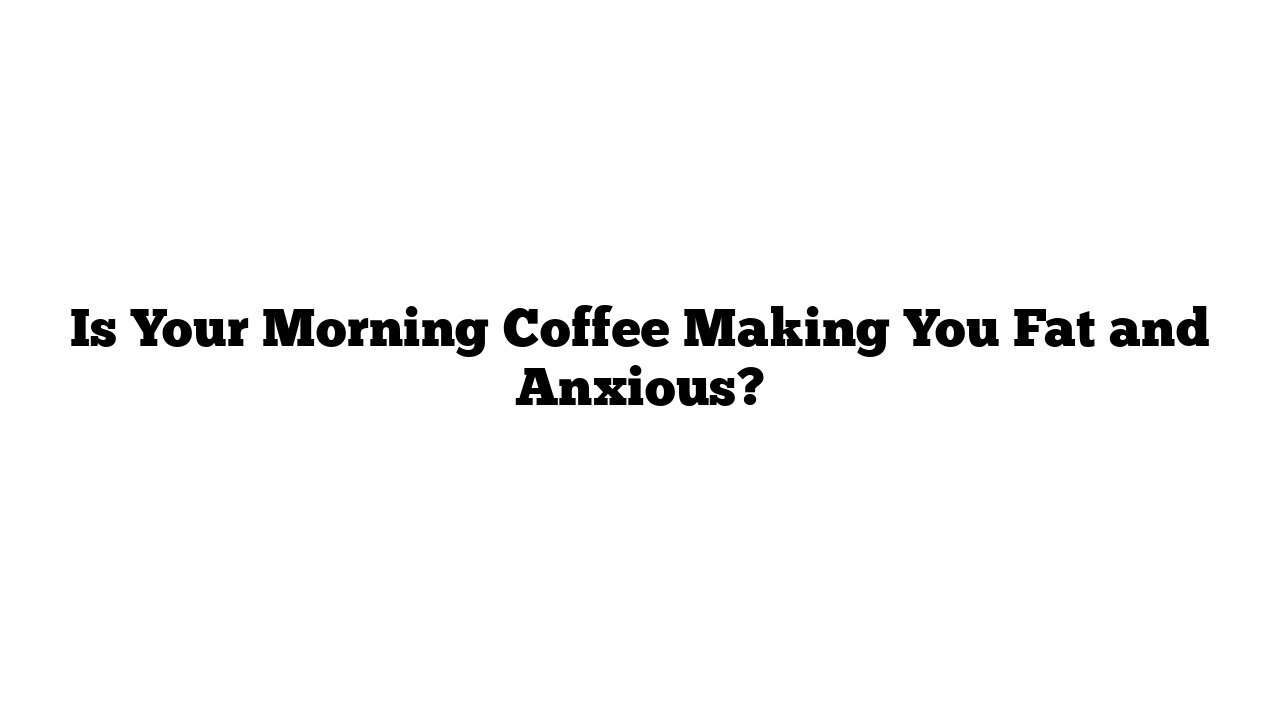Coffee is a beloved morning ritual for millions worldwide, providing that much-needed energy boost to start the day. But does it come with hidden downsides, like weight gain or increased anxiety? Here, we explore the possible effects of coffee on your body, especially if you’re a regular drinker. Let’s dive into how coffee affects hunger, anxiety, and even your overall mood.
Can Coffee Make You Gain Weight?
Many coffee drinkers wonder if coffee could be sneaking extra pounds onto the scale. While coffee alone may not be the culprit, it can indirectly impact your hunger levels and eating habits.
- Stress Hormones and Hunger: Caffeine boosts cortisol, a stress hormone linked to increased appetite. According to Caffeine Blues author Stephen Cherniske, “People who consume more than 300 milligrams of caffeine per day may have elevated cortisol levels for up to eighteen hours a day.” This prolonged stress response can trigger hunger, sometimes leading to overeating.
- Personal Experience with Appetite: Some people find that cutting back on coffee can reduce their appetite and stabilize hunger hormones. For example, after going coffee-free, many people report feeling more satisfied with normal-sized portions of food, rather than needing large meals to feel full.
Caffeine and Anxiety: The Hidden Side Effect?
Caffeine is a stimulant, meaning it speeds up your central nervous system. While this can give you energy, it also heightens alertness and, for some, may lead to increased anxiety.
- Jaw Clenching and Tension: Many coffee drinkers find themselves clenching their jaws more or feeling tense without realizing it. This habit is common among those who feel jittery or anxious after caffeine. Studies have even shown that caffeine can amplify feelings of anxiety in people with existing anxiety disorders.
- Caffeinism: There’s a term for this caffeine-induced anxiety: “caffeinism.” Chronic anxiety from too much caffeine can mimic symptoms of an actual anxiety disorder, making it challenging to tell if your stress is due to life circumstances or caffeine.
Can Coffee Affect Your Heart?
For some, caffeine can lead to an increase in heart rate or blood pressure. In rare cases, excessive caffeine consumption can even trigger heart issues, as seen in a 2017 case where a 16-year-old in California suffered a fatal cardiac event after consuming three caffeinated beverages within 40 minutes.
Though this case was extreme, it highlights how caffeine can affect people differently, particularly in high doses. The recommended limit for caffeine is up to 400 mg per day (about four cups of coffee). But remember, people metabolize caffeine at different rates—some taking as little as two hours, others up to 10 hours, to process half of a caffeine dose.
Is Coffee Good or Bad for Longevity?
Studies have suggested that coffee might actually help you live longer. A 2008 Finnish study found that people who drank seven cups of coffee a day tended to live longer than those who drank less. However, it’s possible that coffee itself isn’t the reason for this increased lifespan. Rather, those who naturally tolerate high caffeine may simply have more robust bodies and healthier livers, which aid in processing caffeine more effectively.
- Tip: If you’re considering quitting coffee for health reasons, try a two-week coffee break and see how it affects your mood, appetite, and energy levels.
How Caffeine Affects Your Mood and Brain Chemistry
The impact of caffeine on mood goes beyond the “boost” you feel after your morning cup. Caffeine works by blocking adenosine, a brain chemical that promotes relaxation and sleep. Over time, your brain compensates by creating more adenosine receptors, meaning that when the caffeine wears off, you may feel even more tired or anxious than before.
- GABA and Serotonin Effects: Caffeine disrupts other mood-regulating brain chemicals, including GABA and serotonin, which help you stay calm and positive. Research shows that caffeine reduces GABA activity in the brain, which can make relaxation harder, especially for those with anxiety.
Coffee vs. Tea: A Different Type of Buzz
If you’ve noticed that tea feels less intense than coffee, there’s a reason for that. Tea contains L-theanine, an amino acid that promotes calmness and reduces the jitteriness often associated with caffeine. Studies show that combining L-theanine with caffeine improves focus and alertness while lessening fatigue and headaches. It’s even a popular supplement for reducing coffee jitters.
Considering a Coffee Break?
If coffee leaves you feeling jittery, anxious, or overly hungry, you might want to experiment with different coffee types or even try a coffee break. Choose higher-quality, organic coffee beans if you continue to drink coffee, as they may contain fewer pesticides and chemicals that can affect your overall experience.
For those curious about alternatives, try pairing your coffee with L-theanine to enjoy a smoother, less anxious buzz. And remember, if you find that quitting coffee benefits your focus, mood, or even weight, it might be worth the trade-off.
Want more wellness insights? Visit medicaltimes.io for similar articles and tips on living a healthier life!
